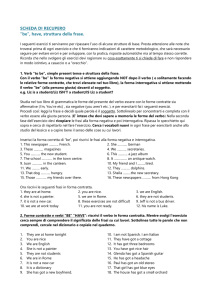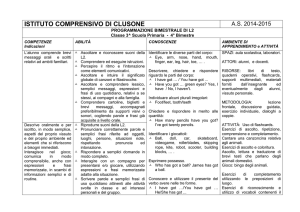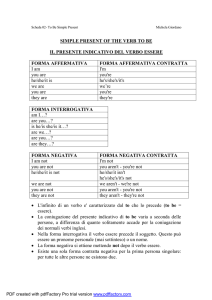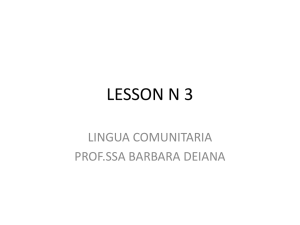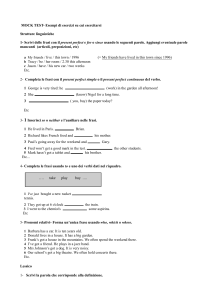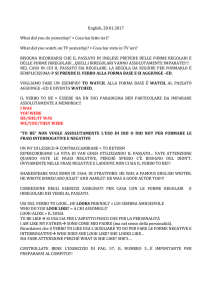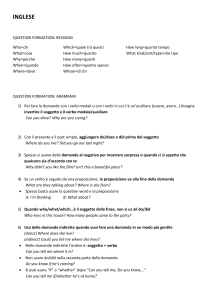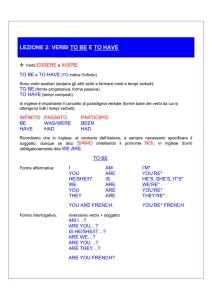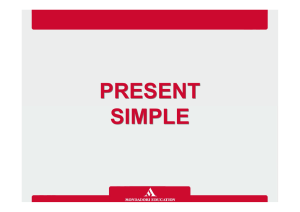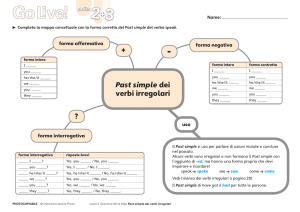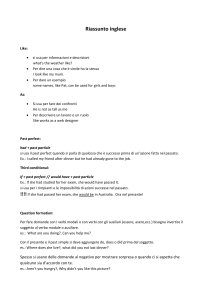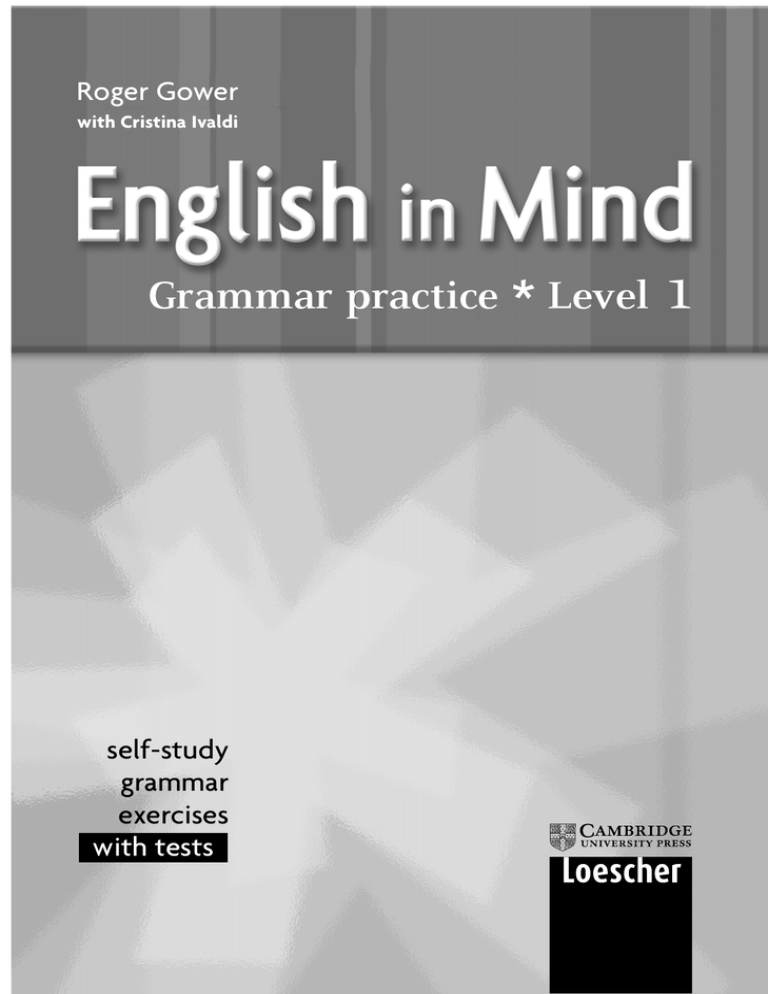
Roger Gower
with Cristina Ivaldi
Grammar practice * Level 1
self-study
grammar
exercises
with tests
English in Mind Grammar practice – Level 1
© Cambridge University Press and Loescher - 2005
http://www.cambridge.org
http://www.loescher.it
I diritti di traduzione, di memorizzazione elettronica, di riproduzione
e di adattamento totale o parziale con qualsiasi mezzo
(compresi i microfilm e le copie fotostatiche) sono riservati per tutti i paesi.
Fotocopie per uso personale (cioè privato e individuale) nei limiti del 15% di ciascun volume
possono essere effettuate negli esercizi che aderiscono all’accordo tra SIAE - AIE - SNS
e CNA - Confartigianato - CASA - Confcommercio del 18 dicembre 2000, dietro pagamento
del compenso previsto in tale accordo.
Per riproduzioni ad uso non personale l’editore potrà concedere a pagamento
l’autorizzazione a riprodurre un numero di pagine non superiore al 15% delle pagine
del presente volume. Le richieste per tale tipo di riproduzione vanno inoltrate a:
Loescher Editore srl Ufficio Contratti
Via Vittorio Amedeo II, 18 10121 Torino
tel.: 011 5654 170 fax: 011 5654 200
e-mail: [email protected]
L’editore, per quanto di propria spettanza, considera rare le opere fuori del proprio
catalogo editoriale. La riproduzione a mezzo fotocopia degli esemplari di tali opere
esistenti nelle biblioteche è consentita, non essendo concorrenziale all’opera.
Non possono considerarsi rare le opere di cui esiste, nel catalogo dell’editore,
una successiva edizione, le opere presenti in cataloghi di altri editori o le opere antologiche.
Nel contratto di cessione è esclusa, per biblioteche, istituti di istruzione,
musei ed archivi, la facoltà di cui all’art. 71-ter legge diritto d'autore.
Maggiori informazioni sul nostro sito: http://www.loescher.it/fotocopie
Ristampe
6
5
4
3
2
1
2010
2009
2008
2007
2006
2005
N
Loescher Editore S.r.l. opera con sistema qualità
certificato CERMET n° 1679-A
secondo la norma UNI EN ISO 9001-2000
Coordinamento del progetto: Ben Graham, Claudia Fiocco
Redazione: Claudia Fiocco
Videoimpaginazione: Imprimatur - Torino
Copertina: Original design concept by Pentacor, adapted by Imprimatur,Torino
Stampa: Legoprint S.p.A. - Trento
Contents
page
She’s a photographer
is am are pronomi personali
4
I’m not from England
is am are negativa
5
Are you a doctor?
is am are interrogativa
5
radio / radios
plurali regolari
person / people
page
a / an / the
countable / uncountable
articoli
30
a / some
countable / uncountable
30
6
I was at a party last night
was / were
31
plurali irregolari
6
He walked on the moon
a / an
articoli indefiniti
7
past simple verbi regolari
affermativa
31
A new book
aggettivi
7
past simple verbi regolari
affermativa e negativa
32
Where’s the river Nile?
parole interrogative + be
8
There is a computer
there is / there are
8
past simple verbi irregolari
affermativa e negativa
33
Is there a bank?
there is / there are interrogativa
e negativa
9
past simple verbi irregolari
interrogativa
33
TEST 1
10
It’s my passport
aggettivi possessivi
11
Katherine’s brother
genitivo sassone
11
I’ve got a car
have got affermativa
e negativa
12
Have you got the keys?
have got interrogativa
13
I can speak English
can per abilità
(so, sono capace)
14
Is that a clock?
this / that
15
These are from Morocco
these / those / this / that
15
Go right
imperativo
16
I’d like the menu
would like
16
TEST 2
He didn’t play the guitar
I went yesterday
Did you go out yesterday?
TEST 5
34
I have to get up early
have to dovere
It’s mine
my mine your yours
aggettivi e pronomi possessivi 36
It’s more expensive
i comparativi di maggioranza 36
The biggest in the world
i superlativi
37
I’m working tomorrow
present continuous per
il futuro
37
I’ll go tomorrow
will / shall
38
She learns quickly
avverbi
38
TEST 6
35
39
17
I’m going to stop the car
going to
40
We must hurry
must / should
40
When I’m 65
when / until / before
41
She works in London
present simple affermativa
18
Coffee comes from Brazil
present simple negativa
e interrogativa
19
I like studying
verb + verb-ing; verb + to + verb
20
What’s she like?
(be) like
41
Do you work on Saturdays?
present simple interrogativa
21
If I finish, I’ll…
I usually get the bus
avverbi di frequenza
22
condizionale / periodo
ipotetico del 1° tipo
42
present perfect verbi regolari
affermativa e negativa
43
present perfect verbi
irregolari
43
TEST 3
Them and us
23
She hasn’t visited Japan
pronomi oggetto
e complemento
24
present continuous affermativa
e negativa
25
The train’s just left
present perfect just / yet
44
Are you working?
present continuous interrogativa 26
Have you finished?
present perfect interrogativa
45
I’m walking home today,
but I usually take a bus.
present simple / continuous
I’m working
TEST 7
TEST 4
How much oil is there?
I’ve lost my keys
28
countable / uncountable
46
27
29
Paradigmi dei principali verbi irregolari
47
Soluzioni ai test
48
She’s a photographer
ឈ Starter Module A-E
is am are pronomi personali
Pronome soggettivo
be
Singolare
Forma contratta
I
am
Tom.
I’m…
You
are
a businesswoman.
You’re…
He
She
Tony
is
a doctor.
He’s…
She’s…
Tony’s…
It
is
a restaurant.
It’s…
Look
Nell’inglese parlato si usa
sempre la forma contratta.
Plurale
We
You
They
Kate and Mary
are
students.
A Inserisci il pronome soggetto.
1
2
she
.......................
Look
We’re…
You’re…
They’re…
(non Kate and Mary’re)
3
4
.....................
.....................
5
6
.....................
8
7
.........................
.....................
He / We is an actor.
.....................
.....................
B Cerchia il pronome soggetto giusto.
1
Il soggetto non può mai
essere sottinteso:
è vero – it’s true;
sono stanco – I’m tired;
siete in ritardo – you’re late
C Inserisci am, is o are.
1 He
5 She / I is a businesswoman.
is
.........................................
a student.
2 They ......................................... doctors.
2 We / She are teachers.
6 We / He is a child.
3 She / They is a doctor.
7 It / He is a taxi.
3 I ......................................... a teacher.
4 It ......................................... a taxi.
5 You ......................................... engineers.
4 I / They are photographers.
8 I / They are waitresses.
6 We ......................................... actors.
7 He ......................................... a photographer.
D Inserisci la forma contratta di be. Associa ogni frase a un disegno a–e.
1 They
2
3
4
5
’re
.............................
photographers.
d
a
She .............................. a doctor.
I .............................. a businessman.
It .............................. a factory.
We .............................. teachers.
E Traduci.
1 Sono un fotografo.
2 Siamo italiani.
3 È un attore.
4
a
c
b
4 È un insegnante.
5 Siete inglesi.
6 Hai 16 anni.
F Adesso scrivi qualche frase su di te.
I ...................................................... . I ...................................................... years old.
I’m a ...............................................................................
e
I’m not from England
is am are negativa
Soggetto
be
not
Forma contratta
I
am
not
I’m not
he
she
Simone
is
not
he isn’t / he’s not
she isn’t / she’s not
Simone isn’t / Simone’s not
it
the taxi
is
not
it isn’t / it’s not
the taxi isn’t / the taxi’s not
not
we aren’t / we’re not
you aren’t / you’re not
they aren’t / they’re not
Gilbert and George aren’t
the girls aren’t
we
you
they
Gilbert and George
the girls
are
A Cerchia la forma giusta.
1 I isn’t / ’m not from France.
2 Jerzy Buzek isn’t / aren’t from Japan.
3 Susan Sarandon and Geena Davis ’m not /
aren’t from France.
4 Emmanuelle Beart aren’t / isn’t from the USA.
5 Ronaldo and Rivaldo isn’t / aren’t from Poland.
6 I’m not / isn’t from Canada.
Are you a doctor?
Interrogativa
am.
I’m not. / I am not.
Is
he
she
it
he
she
it
is.
he
she
it
Are
you
we
they
A Cerchia la forma giusta.
1 Are / Is you from Taiwan?
2 Am / Is she from Malaysia?
3 Is / Are he an engineer?
4 Am / Is / Are they teachers?
5 Is / Are you a photographer?
6 Am / Is / Are she from Poland?
No,
are.
non the girl’re not
Risposta breve
negativa
I
you
we
they
Look
ឈ Starter Module A-E
I
Yes,
non I amn’t
isn’t from Brazil. She’s........................ from Australia.
1 Simone Young .........................................
(Australia)
2 Gilbert and George ..................................... from Russia.They ..................................... from
England. (England)
3 Ryuichi Sakamoto ............................... from England. He ................................. from Japan.
(Japan)
4 Susan Sarandon and Geena Davis ................................ from England.They
.................................... from the USA. (USA)
5 Emmanuelle Beart ................................... from Brazil. She ................................... from France.
(France)
6 I ......................................... from England. I ......................................... from ......................................... .
Am
from
China?
Look
B Completa le frasi.
is am are interrogativa
Risposta breve
affermativa
ឈ Starter Module A-E
you
we
they
isn’t. / is not.
Look
non Yes, I’m
aren’t. / are not.
B Fai corrispondere una risposta a ogni domanda.
1 Is the Taj Mahal in China? •
• a No, they aren’t.
2 Is Rio de Janeiro in Brazil? •
• b No, she isn’t.
3 Is Bill Gates from America? •
• c Yes, he is.
4 Are you a businesswoman? •
• d No, it isn’t.
5 Is Venus Williams an engineer? •
• e No, I’m not.
6 Are the Niagara Falls in Japan? •
• f Yes, it is.
5
radio/radios
ឈ Starter Module A-E
plurali regolari
Singolare
Plurale (+ s)
(a) taxi
(a) book
(a) radio (vocale + o)
(a) boy (vocale + y)
(a) dictionary (consonante + y)
(one) taxi, book, boy, dictionary
taxis
books
radios
boys
dictionaries
A Guarda il disegno. Scrivi le parole giuste.
1
2
3
4
5
6
7
8
person/people
telephone
one .....................................................................................................
two .....................................................................................................
three ................................................................................................
four .................................................................................................
five ......................................................................................................
six .........................................................................................................
seven ...............................................................................................
eight ................................................................................................
ឈ Starter Module A-E
plurali irregolari
Singolare
Plurale
Singolare
Plurale
(-ch, -sh, -s, -x, -o)
(a) watch
dish
bus
box
(+ -es)
(two) watches
dishes
buses
boxes
(-f/-fe)
knife
(+ -ves)
knives
person
woman
man
child
foot
tooth
tomato
fish
people
women
men
children
feet
teeth
tomatoes
fish
A Guarda questi sostantivi plurali. Indica
se sono giusti (✓) o sbagliati (✗)?
oranges
6 tomatos
4 apple
onions
6 eggs
2 boxes of matchs
potatoes
fishs
2 knifes
2 dishs
6
1
2
3
4
5
6
7
8
9
10
B Scrivi il plurale di questi sostantivi
in corrispondenza dei disegni.
✓
✗
glass fax dress shelf
brush woman match
...................
........................
........................
........................
........................
1
brushes
1
...........................................................
2
...........................................................
3
...........................................................
4
...........................................................
2
3
4
........................
........................
5
Glossario
orange
ឈ
arancia
apple
ឈ
mela
........................
5
...........................................................
........................
6
...........................................................
6
onion
ឈ
cipolla
........................
7
...........................................................
7
match
ឈ
fiammifero
a/an
ឈ Starter Module A-E
articoli indefiniti
a (+ suono consonantico)
an (+ suono vocalico)
a guitar
/ /
a camera
/ k/
a uniform
/ju/
an apple
//
an ice-cream
/a/
an umbrella
//
Look
/ju:/ di uniform e Europe,
/w/ di water e /h/ come
in hotel sono suoni
consonantici
A Indica se è giusto (✓) o sbagliato (✗).
1 an office
✓
5 an university
..........................
✗
Look
alcune parole come
honest e hour hanno la
h muta – cominciano
con suono vocalico
B Scrivi a oppure an.
1
2
3
4
5
6
7
8
..........................
2 an student
..........................
6 an girl
..........................
3 a airport
..........................
7 an engineer
..........................
4 a station
..........................
8 an aeroplane
..........................
a
an
cup
egg
......................................... telephone
......................................... envelope
......................................... newspaper
......................................... chair
......................................... orange
......................................... pen
.........................................
.........................................
C Scrivi a oppure an e la parola relativa al disegno.
an apple
1 ..................................................
3 ..................................................
5 ..................................................
2 ..................................................
4 ..................................................
5 ..................................................
A new book
be + aggettivo
7 ..................................................
ឈ Starter Module A-E
aggettivi
aggettivo + sostantivo
a big pizza
It’s big.
It isn’t small.
Look
A nice big Italian pizza (non An Italian big nice pizza)
l’aggettivo di opinione è di solito il primo; l’aggettivo di
dimensione di solito precede gli altri aggettivi descrittivi
A Cerchia la forma giusta.
1 He’s an old man / a man old.
2 She’s a young / young.
3 The watch is expensive / an expensive.
4 They’re apples cheap / cheap apples.
5 It’s a small English dictionary /
an English small dictionary.
6 It’s big book / a big book.
7 The ice-cream is a cold / cold.
8 It’s hot coffee / coffee hot.
9 It’s a chair new / a new chair.
10 It’s old table / an old table.
B Riscrivi, mettendo le parole nell’ordine giusto.
a kind old man
1 kind / man / a / old
.......................................................................................
2 umbrella / red / a / big
.......................................................................................
3 a / cheap / radio / small
.......................................................................................
4 tall / a / woman / young
.......................................................................................
5 drink / hot / chocolate / a
.......................................................................................
6 expensive / watch / a / small
.......................................................................................
7 beautiful / table / old / a
.......................................................................................
8 pizza / a / nice/ big
.......................................................................................
7
Where’s the river Nile?
ឈ Starter Module A-E
parole interrogative + be
Parola
interrogativa
Verbo
Soggetto
Forma
contratta
Where
is
the station?
Where’s…
When
is
New Year?
When’s…
Where
When
is it?
What
is
your name?
What’s…
What
Who
is
Frieda Kahlo?
Who’s…
Who
A Completa le domande con where, when, what oppure who. Poi rispondi.
What
’s your name? .............................................................................................................................................
................................... ’s your job? ......................................................................................................................................................
.................................... ’s your birthday? .................................................................................................................................
1
2
3
...................................
4
5
6
are you from? .........................................................................................................................................
..................................... ’s the president of your country?................................................................
...................................... ’s your address? ...................................................................................................................................
.....................................
B Completa le domande in base alle risposte.
What’s the Hermitage?’
‘........................................
.‘....................................... the capital of Bulgaria?’
.‘....................................... Ralph Fiennes?’
‘........................................ the River Nile?’
‘........................................ the Rio Carnival?’
1
2
3
4
5
‘It’s a museum.’
‘Sofia.’
‘He’s an actor.’
‘In Africa.’
‘In February.’
6 ‘........................................ Chinese New Year?’
7 ‘........................................ the Sorbonne?’
8 ‘........................................ the Andes Mountains?’
9 ‘........................................ The Independent?’
There is a computer
ឈ Starter Module A-E
there is/there are
there is / there are
‘In January and
February.’
‘It’s a university.’
‘They’re in South
America.’
‘It’s an English
newspaper.’
Forma contratta
Singolare
There
is
a clock.
There’s a…
Plurale
There
are
two pictures.
(non esiste)
A Guarda il disegno. Cerchia la forma giusta.
1 There’s / There are a mirror.
2 There’s / There are two pictures.
3 There’s / There are a briefcase.
4 There’s / There are a clock.
5 There’s / There are three pens.
6 There’s / There are a diary.
7 There’s / There are an umbrella.
B Guarda il disegno. Scrivi There’s oppure
There are.
1
2
3
4
8
There’s
..................................................................................
..................................................................................
..................................................................................
..................................................................................
a camera.
four books.
a printer.
two phones.
5
6
7
..................................................................................
..................................................................................
..................................................................................
three pens.
a chair.
a computer.
C Scrivi qualche frase sulla tua
camera usando There’s
oppure There are.
Is there a bank?
ឈ Starter Module A-E
there is/there are interrogativa e negativa
Negativa
Singolare
There
isn’t
a
station.
Plurale
There
aren’t
any
buses.
Interrogativa
Risposta breve
Singolare
Is
there
a
university?
Yes, there is.
No, there isn’t.
Plurale
Are
there
any
banks?
Yes, there are.
No, there aren’t.
some/any
Railway Station
Affermativa
There are some banks.
Negativa
There aren’t any banks.
Interrogativa
Are there any banks?
Royal
Palace
OLD
TOWN
NEW
Batha
Weapons
A Guarda la cartina di Fez, in Marocco. Cerchia
TOWN
Museum
Museum
Hospital
la forma giusta in ogni frase su Fez.
1 There’s a / There are some station.
University
2 There’s a / There are some river.
Jamai
Palace
3 There’s a / There are some museums.
4 There’s a / There are some university in the new town.
Key
River
5 There isn’t a / There aren’t any university in the old town.
Roads
6 There isn’t a / There aren’t any beaches.
7 There’s a / There are some palaces.
B Guarda la cartina e rispondi alle domande.
C Completa le frasi.
are museums and there (2) .........................................
In Fez there (1) .........................................
palaces.There (3) ......................................... any beaches but there (4)
......................................... a river.There (5) ......................................... a university.There (6)
......................................... a station in the old town but there (7) ......................................... a
station in the new town.
1
2
3
4
5
6
Yes, there is.
Is there a station? .......................................................................................
Is there a river? ..............................................................................................
Are there any museums?..............................................................................
Are there any beaches?..............................................................................
Is there a university in the old town?..............................................................................
Are there any palaces?..............................................................................
D Guarda la cartina di Vancouver, in Canada. Completa le domande su Vancouver e rispondi.
STANLEY
PARK
English Bay
Beach
Roedde House
Museum
NELSON
PARK
Sunset
Beach
Vancouver
Art Gallery
St. Paul’s Orpheum
Hospital
Theatre
Ramada Hotel
Key
Train Stations
Roads
E Completa la cartolina.
Q.E
Theatre
1
2
3
4
5
6
7
Are there any
......................................................................................................................................
......................................................................................................................................
......................................................................................................................................
......................................................................................................................................
......................................................................................................................................
......................................................................................................................................
......................................................................................................................................
Yes, there are.
theatres? ...........................................................................................................
art gallery? .................................................................................................
museum? .......................................................................................................
train stations? .......................................................................................
underground? .....................................................................................
parks and beaches? .....................................................
zoos? .......................................................................................................................
P O S TCA R D
Dear Kate
There’s .......................
an
I’m in downtown Vancouver. There’s a lot to do. (1).......................
art
gallery and (2)....................... ....................... museum. Also, (3)....................... ....................... two
theatres. (4)....................... ....................... parks and beaches but (5).......................
....................... ....................... zoos. (6)....................... ....................... five train stations but
(7)....................... ....................... ....................... underground.
See you soon, love Sam
9
Test 1
ឈ Starter Module A-E
A Underline the correct word.
1 a / an chair
2 a / an office
3 dictionaries / dictionarys
4 childs / children
5 womans / women
5
C
1
2
3
4
5
B Write the plural.
1 diary .............................................................................................................................................................
2 potato ........................................................................................................................................................
3 man ................................................................................................................................................................
4 shelf ...............................................................................................................................................................
5 person .........................................................................................................................................................
5
Write the short form.
I am from Australia.
................................................................................................................................................
6 She has not got a diary. ..................................................................................................................................
She is not from France. ..................................................................................................................................
7 There are not any pens. .................................................................................................................................
There is a shop....................................................................................................................................................................
8 It is not noisy. .......................................................................................................................................................................
They are not cheap. ................................................................................................................................................
9 You are not old. ...............................................................................................................................................................
They have got a car. ..............................................................................................................................................
10 I have not got a brush. .....................................................................................................................................
10
D Complete the sentences. Use short forms
where possible.
– (1) This ........................................ Pete. (2) He ......................................... a doctor.
– Hi! (3)......................................... ’m Sandra.
E Make questions.
1 you/from Brazil? .................................................................................................................................................................
.......................................................................................................................................................................................................................................
2 Venus and Serena Williams/tennis players?
– (4)......................................... you from Japan?
– No, (5) we
– (6) We
.........................................
.........................................
..............................................................
.......................................................................................................................................................................................................................................
3 there/any pens?.........................................................................................................................................................................
.
from China.
.......................................................................................................................................................................................................................................
4 there/a university?
– (7)......................................... Pete and Sandra teachers?
– No, (8).................................................................................. .
...........................................................................................................................................................
.......................................................................................................................................................................................................................................
5 Rio de Janeiro/in Brazil?
– (9)......................................... it expensive?
................................................................................................................................
.......................................................................................................................................................................................................................................
– Yes, (10).................................................................................. .
5
10
F Make the sentences negative.
1 She’s from Poland. ...........................................................................................................................................................
2 They’re cold. ................................................................................................................................................................................
3 The camera’s cheap. .....................................................................................................................................................
4 We’re students. .........................................................................................................................................................................
5 The cars are from England. ........................................................................................................................
G Write sentences. Use short forms where possible.
1 There/six people .............................................................................................................................................................
2 There/umbrella
..................................................................................................................................................................
3 There/a clock and a mirror ......................................................................................................................
4 There/a desk ...............................................................................................................................................................................
5 There/a bank in town ...........................................................................................................................................
5
H Complete the questions with
Where, When, What or Who.
1 ‘ ............................................................ are you?’ ‘I’m John Marley.’
I Correct the mistakes.
1 Are there some oranges?
.....................................................................................................................................
2 There isn’t any computers. .......................................................................................................
2 ‘ ............................................................ ’s your bag?’ ‘It’s on the table.’
3 Is there any hotels? .............................................................................................................................................................
3 ‘ ............................................................ are you?’ ‘At school.’
4 Is there museum?
4 ‘ ............................................................ ’s your name?’ ‘Sally.’
.................................................................................................................................................................
5 It’s expensive car. ..................................................................................................................................................................
5
5 ‘ ............................................................ ’s Christmas?’ ‘It's in December.’
5
10
5
TOTAL
55
It’s my passport
Pronome
soggetto
Aggettivo
possessivo
I
you
he
she
it
we
they
my
your
his
her
its
our
their
ឈ Starter Module F-I
aggettivi possessivi
Look
(! you’re = you are)
il mio passaporto
my passport non the my passport
(! it’s = it is)
(! they’re = they are)
A Cerchia la parola giusta.
1 Its / It’s my umbrella.
2 Have you got your / you’re radio?
3 Your / You’re late!
4 It’s / Its their money.
5 I’ve got you’re / your passport.
6 It’s they’re / their camera.
B Completa l’e-mail inserendo
gli aggettivi possessivi.
Katherine’s brother
Is that your suitcase?
No, this is my suitcase.
To: Jack <[email protected]>
From: Liz <[email protected]>
Subject: new house
Date: 18 Jan 2002
Hi Jack
your
How is (1)......................................... new house in Dublin? (2)......................................... brother
is in Dublin too – (3)......................................... name’s Ronan Dodd and he’s
got a small restaurant. (4)......................................... name is Pizza House.
(5)......................................... wife is a doctor. (6)......................................... name’s Mary. He’s
got 2 children. (7)......................................... names are Ella and Tom. So,
phone them – (8)......................................... telephone number is 01 841 2617.
ឈ Starter Module F-I
genitivo sassone
Genitivo sassone
Singolare
one boy
a child
noun + ’s
the boy’s mother
the child’s mother
Plurale (regolare) sostantivo
two boys
noun + ’
the boys’ mother
Plurale (irregolare) sostantivo
two children
noun + ’s
the children’s mother
Look
il fratello di Katherine
Katherine → Katherine’s brother
non the Katherine’s brother
il fratello delle bambine
the girls → the girls’ brother
Cherie is Tony Blair’s wife.Tony is Cherie’s husband. Nicholas and Katherine are Tony and Cherie’s children.
! Tony Blair’s the British Prime Minister. (=Tony Blair is…) He’s got four children. (=He has got…)
A Completa le frasi con le forme del genitivo sassone.
1
2
3
4
5
6
7
8
Cherie’s sons. (Cherie)
Nicholas, Euan and Leo are Tony and .......................................................
Katherine is Cherie and ....................................................... daughter. (Tony)
Katherine is ....................................................... sister. (Leo)
Nicholas is ....................................................... brother. (Katherine)
Cherie Blair is Nicholas, Euan, Leo and ....................................................... mother. (Katherine)
The ....................................................... father is Tony Blair. (children)
Katherine is a ....................................................... name. (girl)
The .................................................... names are Euan, Nicholas and Leo. (boys)
B Traduci usando il genitivo
sassone.
1 Tom è il fratello di Lisa.
2 Sam è il figlio del Sig. Eliott.
3 Il computer dei bambini è nella loro
stanza.
4 È la stanza degli insegnanti.
5 Laura è la madre di Roger e Monika.
11
I’ve got a car
ឈ Starter Module F-I
have got affermativa e negativa
Affermativa
Forma contratta
Negativa
Forma contratta
He
She
It
he’s got
she’s got
it’s got
He
She
It
hasn’t got
I’ve got
you’ve got
we’ve got
they’ve got
I
You
We
They
has got
I
You
We
They
a car.
have got
has not got
a car.
have not got
A Riscrivi le frasi con la forma contratta di have got.
1
2
3
4
5
6
haven’t got
B Inserisci hasn’t got oppure
haven’t got.
She’s got 6 Swiss Francs.
She has got 6 Swiss Francs. .......................................................................................................................
I have got 60 Indian Rupees. ...............................................................................................................
We have got 260 Japanese Yen. ...........................................................................................................
You have got 15 Polish Zloty. ...............................................................................................................
They have got 3 US Dollars. ..................................................................................................................
buys:
He has got 6 Euros. ....................................................................................................................................................
£1 sterling
1
2
3
4
5
6
1.637
Euros
7.077
6
Chi ha più soldi? ............................................................................................................................................................ (Rupees)
India
9
1 0.870
)
Japan (Yen
6.516
ty)
Poland (Zlo
2.478
)
d (Francs
Switzerlan
.501
1
ars)
USA (Doll
haven’t got a coat.
I ..................................................................
We ......................................................................... an umbrella.
She ........................................................................ a hat.
He ........................................................................ any gloves.
I ........................................................................ a jumper.
They .................................................................. umbrellas.
C Completa la descrizione dell’appartamento usando It’s got oppure It hasn’t got.
1
2
3
4
5
6
It hasn’t got
a garden.
a kitchen.
.............................................................................. two bathrooms.
............................................................................... one bathroom.
............................................................................... a big living room.
............................................................................... a big dining room.
...............................................................................
..............................................................................
D Questo è il salotto di Jane e Danny. Completa le frasi usando They’ve got oppure They haven’t got.
1
2
3
4
5
6
7
8
E Parla di te usando ’ve got oppure haven’t got.
1 I
2 I
3 I
12
haven’t got
a new computer.
.............................................................................. an old car.
............................................................................... a guitar.
..............................................................................
4 I
5 I
6 I
a video.
............................................................................... a new watch.
............................................................................... two radios.
...............................................................................
They’ve got
a mirror.
a guitar.
............................................................................... two armchairs.
............................................................................... any pictures.
............................................................................... a big table.
............................................................................... a lamp.
............................................................................... a clock.
............................................................................... a small table.
.............................................................................
...............................................................................
Have you got the keys?
Interrogativa
Have
Has
I
you
we
they
Risposta breve affermativa
got the keys?
ឈ Starter Module F-I
have got interrogativa
Yes,
he
she
it
I
you
we
they
he
she
it
Risposta breve negativa
have.
No,
has.
I
you
we
they
haven’t.
he
she
it
hasn’t.
A Kate e Dan stanno partendo per le vacanze con i figli, Karl e Lucy. Sottolinea le forme corrette.
1 Have / Has the children got any sunglasses? – Yes, they have / has.
2 Have / Has you got the keys? – No, I haven’t / hasn’t.
3 Have / Has he got a suitcase? – No, he haven’t / hasn’t.
4 Have / Has they got any money? – Yes, they have / has.
5 Have / Has she got a toothbrush? – No, she haven’t / hasn’t.
6 Have / Has you got the credit card? – No, I haven’t / hasn’t.
7 Have / Has we got the passports? – Yes, we have / has.
8 Have / Has you got a hat? – Yes, I have / has.
B Kate vuole essere sicura che i figli abbiano tutto. Scrivi le sue domande e aggiungi le risposte di Dan
in base al disegno.
1 Karl/an umbrella?
Has Karl got an umbrella?
....................................................................................................................................................................................................
Yes, he has.
........................................................................................
2 Lucy/a toothbrush?
.....................................................................................................................................................................................................
........................................................................................
3 Karl/a passport?
.....................................................................................................................................................................................................
........................................................................................
4 they/cameras?
.....................................................................................................................................................................................................
........................................................................................
5 Lucy/any books?
.....................................................................................................................................................................................................
........................................................................................
6 they/any money?
.....................................................................................................................................................................................................
........................................................................................
7 Karl/a radio?
.....................................................................................................................................................................................................
........................................................................................
C Rispondi a queste domande parlando di te.
1 Have you got a credit card? .......................................................................................................................... 5 Has your best friend got a British passport? ................................................
2 Have you got a British passport? ...................................................................................................... 6 Has your home got three bedrooms? .....................................................................................
3 Have you got any English money? . ............................................................................................. 7 Have all your friends got email addresses? ..................................................................
4 Have you got any English books? ...................................................................................................
13
I can speak English
Affermativa e negativa
I
You
He
She
It
We
They
Interrogativa
can swim.
Can
can’t swim. (= cannot)
She can speak English.
He can’t speak English.
ឈ Starter Module F-I
can per abilità (so, sono capace)
Risposta breve
I
you
he
she
it
we
they
I
you
he
she
it
we
they
Yes,
swim?
No,
can.
can’t.
Hello
A Guarda i questionari di un’agenzia di collocamento. Trova un lavoro a ogni persona tra questi annunci.
a
Asha
.....................................................
a
b
.....................................................
c
.....................................................
Sales people –
Middle East and North Africa
Can you drive?
Can you speak French and Arabic?
STAR Job AgencyJob AgencyJob Agency
FIRST NAME: Asha
FIRST NAME: Lara
IRST NAME: Alain
SURNAME: Hamid
SURNAME: Clark
SURNAME: Pascal
✓
b
Secretary
Can you use a computer?
Can you type 60wpm?
drive
type (60wpm)
use a computer
use the internet
c
r Teacher
Compute computer?
se
you u a
Can
rnet?
se the inte
Can you u
B In base alle informazioni dell’esercizio A,
queste affermazioni sono vere (✓) o false (✗)?
1
2
3
4
5
6
✗
Alain can drive. ...........................
Lara can use the internet. ...........................
Asha can’t type. ..........................
Alain can’t speak French. .......................
Asha can use a computer. ......................
Lara and Alain can’t drive. ......................
speak French
speak Arabic
✓
■
■
✓
■
✓
✓
■
✓
■
■
■
■
■
■
■
■
■
✔
■
✔
■
■
✔
■
■
C Completa le frasi in base alle informazioni
dell’esercizio A.
1
2
3
4
5
6
can’t type.
Lara ........................................
Asha ........................................ drive.
Alain ........................................ speak Arabic.
Asha and Alain ........................................ use the internet.
Asha ........................................ speak French and Arabic.
Lara ........................................ speak French or Arabic.
D Completa queste frasi parlando di te.
1
2
3
4
5
6
I
I
I
I
I
I
can/can’t
drive.
type.
.......................................................... use a computer.
.......................................................... use the internet.
.......................................................... speak Arabic.
.......................................................... speak English.
..........................................................
..........................................................
Glossario
sales person/people
ឈ
venditori
type
ឈ
scrivere a macchina
wpm (words per minute) ឈ
job agency
14
ឈ
parole al minuto
ufficio di collocamento
Is that a clock?
ឈ Starter Module F-I
this/that
this (questo-questa) (+ sostantivo singolare)
that (quello-quella) (+ sostantivo singolare)
This picture is Japanese.
That picture is Japanese.
A Completa le frasi usando this oppure that.
That
1
...................................
camera’s cheap.
3
2
...................................
lamp’s expensive.
4 Is
...................................
phone’s very small.
...................................
These are from Morocco
TV new?
5 Is
6
...................................
...................................
a Swiss clock?
is a digital camera.
ឈ Starter Module F-I
these/those/this/that
these (questi-queste) (+ sostantivo plurale)
those (quelli-quelle) (+ sostantivo plurale)
These flowers are beautiful.
Those flowers are beautiful.
this (questo-questa) (+ sostantivo singolare)
that (quello-quella) (+ sostantivo singolare)
This flower is beautiful.
That flower is beautiful.
A Sottolinea la forma corretta.
1 Is this / these your book?
2 I work with that / those woman.
3 That / Those man’s got the keys.
4 This / These is my sister’s child.
5 This / These children study English.
6 Who are that / those people?
B La guida sta parlando del museo. Guarda il disegno e completa le sue frasi usando these, those, this
o that.
this museum. In (2)....................................... room we’ve got work from South America
We’ve got things from all over the world in (1).......................................
and Africa.The things on (3)....................................... table are from Africa. (4)....................................... plates are from Morocco and (5)....................................... mask is
from Kenya. (6)....................................... chairs are about 100 years old. (7)...................................... three pictures on (8)..................................... wall over there are by the
Mexican artist, Frieda Kahlo. (9)....................................... big picture is by her husband, Diego Rivera. (10)....................................... bottles are from Brazil.
15
Go right
ឈ Starter Module F-I
imperativo
Imperativo affermativo
verbo (forma base)
Turn right.
Imperativo negativo
don’t + verbo (forma base)
Don’t turn right.
Go straight ahead.
Don’t go in here.
Look
L’imperativo è l’unico tempo in cui in inglese non compare il soggetto.
non you turn right
A Fai corrispondere ogni
frase a un disegno.
non you don’t turn right
a
b
b
1 Turn left. ..........................
2 Don’t take photographs. ..........................
.
c
d
3 Wash your hands. .........................
4 Don’t open the window. ..........................
open
B Completa le frasi usando le parole del riquadro.
Wear a coat. It’s raining.
1 .........................................
2 Please ......................................... the window. It’s hot in this room.
3 It’s OK. ......................................... my computer. I’m not working on it.
don’t open
would like
like
would like (’d like)
I/We like coffee. (in generale)
(= I/We think coffee is nice.)
I/We’d like some coffee. (adesso)
(= I/We want some coffee.)
Do you like tea?
f
5 Don’t park your car here. ..........................
6 Be careful! ..........................
wear
don’t wear
use
don’t use
4 ......................................... a coat. The sun’s shining.
5 Please ......................................... the window. It’s cold in this room.
6 Please ......................................... my computer. I’m working on it.
I’d like the menu
Yes, I do.
No, I don’t.
e
ឈ Starter Module F-I
Would you like some tea?
(= Do you want…?)
Yes, please!
No, thanks.
Look
Si dice Yes, please.
non
Yes, thanks
Look
like/love + verbo-ing si usa per quello che piace in generale:
would like/would love (’d like/’d love) si usa per quello che si vuole in un dato momento.
A Chiedi le cose che vedi nei disegni. Usa I’d like /
We’d like e le parole nel riquadro.
the menu
fish soup
bottle(s) of mineral water
cup(s) of coffee
the bill
3
1
2
We’d like the menu, please. ’
1 (we) ‘ .................................................................................................................................
2 (I) ‘ .........................................................................................................................................’
3 (we) ‘ .................................................................................................................................’
5
4
4 (we) ‘ ................................................................................................................................’
5 (I) ‘ .........................................................................................................................................’
6 (we) ‘ .................................................................................................................................’
16
6
B Sottolinea la forma corretta.
1 I like / I’d like some soup. – Of course. Fish
soup or onion soup?
2 Would you like / Do you like the dessert
menu? – No, thanks.
3 I like / I’d like this restaurant. – Me, too.The
food is wonderful.
4 I’d like / Would you like the bill? – Yes,
please.
5 I like / I’d like a tomato salad. – Of course.
Large or small?
6 Would you like / Do you like tea with
lemon? – No, I don’t.
Test 2
ឈ Starter Module F-I
A Write sentences. Use short forms where possible.
1 My car/not got/a radio
........................................................................................
2 John and Lisa/got/a new car ........................................................................................
3 She/got/an apple
........................................................................................
4 I/not got/a clock
........................................................................................
5 Tom/not got/a computer
........................................................................................
B Make the sentences negative.
1 He can drive.
.....................................................................................................
2 They can swim.
.....................................................................................................
3 Laura's got two children. .....................................................................................................
4 I’ve got two cars.
.....................................................................................................
5 She’s got a newspaper.
.....................................................................................................
5
C Underline the correct answer.
1 That’s Hillary / Hillary’s car.
2 I’ve got the children’s / childrens’ passports.
3 It’s they’re / their dog.
4 This is / That’s the French President on TV.
5 Can you speak / to speak French?
6 Please come / to come here.
7 Look at this / these picture.
8 Would / Do you like the menu? Yes, please.
9 I like / I'd like New York.
10 That / Those people come from India.
5
D Complete the sentences with a possessive
adjective.
D Complete the sentences with a possessive form.
1 This is ......................................... passport. (I)
12 It’s
camera. (he)
It’s ......................................................................................
......................................... camera. (I)
...................................................................................... car. (his mother)
This is
isn’t
......................................... suitcase. (they)
32 This
room is(you)
there (she).
43 ......................................................................................
Have you got ......................................... passport?
45 Chelsea
is .................................................................................
daughter. (Bill and
radio? (she)
Is this .........................................
Hillary)
5 He is the two .................................................................................. father. (boys)
10
E Complete the sentences with a possessive form.
1 It’s ...................................................................................... camera. (he)
2 This isn’t ...................................................................................... car. (his mother)
3 ...................................................................................... room is there. (she)
4 Chelsea is ................................................................................. daughter. (Bill and
Hillary)
5 He is the two .................................................................................. father. (boys)
5
F Complete the answers.
1 Has she got a new car?
2 Can you type?
3 Have you got a hat?
4 Have the children got a dog?
5 Can Sarah swim?
Yes, ...................................................................... .
No, ...................................................................... .
No, ...................................................................... .
No, ...................................................................... .
Yes, ...................................................................... .
5
G Look at the answers and write questions.
1 (Mark/his passport?)..............................................................................................................................................................................
2 (you/your keys?) .......................................................................................................................................................................................
3 (speak/Russian?) .......................................................................................................................................................................................
4 (this car/new?) .............................................................................................................................................................................................
5 (Sam and Tim/use/a computer?) ....................................................................................................................................
5
‘Yes, he has.’
‘Yes, I have.’
‘No, I can’t.’
‘Yes, it is.’
‘Yes, they can.’
5
H Correct the mistakes.
1 Is this you’re car? ..................................................................................................................................................................................
2 Have you got chair? .........................................................................................................................................................................
3 He can typing very well. ........................................................................................................................................................
4 What’s the president of South Africa? ...............................................................................................................
5 What’s those? ............................................................................................................................................................................................
6 ‘Do you like some apples?’ ‘Yes, please.’ ...........................................................................................................
7 This is the childrens' bedroom. ....................................................................................................................................
8 That pictures are beautiful. ..................................................................................................................................................
9 The photographers's studio is very big. ...........................................................................................................
10 The John's brother is an engineer. ...........................................................................................................................
5
TOTAL
45
17
She works in London
ឈ Unit 1
present simple affermativa
Verbi regolari
Forma base:
I/you/we/they
he/she/it
work
work
works
live
live
lives
Professor Burke works in London.
She teaches engineering at the
University of West London.
Verbi irregolari
teach
teach
teaches
go
go
goes
PROFESSOR FIONA BURKE
Department of Engineering
University of West London
Tel: 01558 985983
[email protected]
Verbo + s/es
verbo:
work
start
live
get up
manage
play
→
→
→
→
→
→
+s
works
starts
lives
gets up
manages
plays
study
study
studies
have
have
has
be
am/are
is
Look Il present simple non si usa per azioni che si
svolgono in questo momento: non I go to school now.
Per azioni che si svolgono in questo momento si deve usare il
present continuous. V. pagg. 25-27
verbo che finisce in -ch/-sh/-ss/-x/-o: +es
teach
→
teaches
finish
→
finishes
go
→
goes
verbo che finisce in consonante +y:
y+ies
study
→
studies
A Completa la tabella con i verbi al present simple.
Forma base
I
you/we/they
he/she/it
travel
be
finish
have
get up
manage
travel
B Completa l’articolo di giornale inserendo i verbi del riquadro al present simple.
finish
eat
go
get up
be
live
work
The President’s Day
is
George W Bush (1) ............................... the US President. He (2) .............................. with his family in
the White House, in Washington. He (3) .............................. for about 11 hours every day.
He (4) .............................. at 5:45 am and (5) .............................. into his office at 6:45 am. He
(6) .............................. a sandwich for lunch and he (7) .............................. work at 6 pm.
C Leggi questo curriculum.
Completa le affermazioni
su Jane inserendo i verbi
al present simple.
Jane Wells
ndsor Road
Wi
19
Brighton
Employment
nager (current job)
1997 to now: Sales Ma
on
Impact Books Ltd, Lond
le
op
pe
• manage 3
• travel in Europe
• meet customers
Ms
• sell books and CD-RO
D Cerchia la forma giusta del verbo.
1 I live / lives in London.
2 The president get / gets up at 7 a.m.
3 She has / have a sandwich for lunch.
18
lives
Jane Wells (1) .....................................................
in Brighton.
She (2) ..................................................... in London.
She (3) ..................................................... the Sales Manager
for Impact Books. She (4).....................................................
three people. She (5).................................................. in Europe
and (6) ..................................................... customers.
She (7) ................................................. books and CD-ROMs.
4 He teachs / teaches Maths.
5 My mum go / goes to work by bus.
Coffee comes from Brazil
Affermativa
Negativa
He
She
It
He
She
It
works.
Interrogativa
present simple negativa e interrogativa
doesn’t
work.
Look Il present simple non si usa
per azioni che si svolgono in questo momento: non I go to school now.
does.
Per azioni che si svolgono in questo momento si deve usare il present continuous.
V. pagg. 25-27
Risposta breve
Does
he
she
it
Yes,
work?
Where does
she
work?
he
she
it
No,
ឈ Unit 1
doesn’t.
In a bank.
A Usa i suggerimenti per scrivere frasi affermative o negative al present simple.
1
2
3
4
Coffee comes from Brazil.
(coffee/come from Brazil) ......................................................................................................................................................................................................................
Hillary Clinton doesn’t speak Russian.
(Hillary Clinton/speak Russian) ............................................................................................................................................................................................
(Italy/make pasta).......................................................................................................................................................................................................................................................
(the Trans-Siberian railway/go from Moscow to Vladivostok) ...........................................................................
..............................................................................................................................................................................................................................................................................................................................
5 (the President of South Africa/live in London) ....................................................................................................................................
..............................................................................................................................................................................................................................................................................................................................
6 (the sun/go round the earth) ........................................................................................................................................................................................................
7 (rice/grow in Poland) .....................................................................................................................................................................................................................................
B Completa le domande su Sam. Usa does e i verbi suggeriti nel riquadro.
speak watch listen drink read wear read
1
2
3
4
Does he watch
videos?
......................................................................................... to salsa music?
......................................................................................... tea?
......................................................................................... the Mirror newspaper?
.........................................................................................
drink
5
6
7
8
coffee?
......................................................................................... French?
......................................................................................... glasses?
......................................................................................... the Guardian newspaper?
.........................................................................................
C Guarda la stanza di Sam e rispondi alle domande in base a quello che vedi nel disegno.
1
2
3
4
5
6
7
8
Yes, he does.
..........................................................................................................................
..........................................................................................................................
..........................................................................................................................
..........................................................................................................................
..........................................................................................................................
..........................................................................................................................
..........................................................................................................................
..........................................................................................................................
D Traduci usando la risposta
breve dove è necessaria.
1 Sheila vive a Mosca.
2 ‘Parla russo?’ ‘Sì.’
3 ‘Legge la Pravda?’ ‘No, legge il
Moscow News.’
4 ‘Beve tè?’ ‘No, beve caffè.’
19
I like studying
I
ឈ Unit 1
verb + verb-ing; verb + to + verb
Verbo
+ verbo-ing
Verbo
+ to + verbo
love
enjoy
like
hate
travelling.
studying.
hope/love/like
want/hate
would like (= I’d like)
would love (= I’d love)
to travel.
to study.
I
Look
like/love + verbo-ing si usa per quello
che piace in generale; would
like/would love si usa per quello che si
vuole in un dato momento
verbo + ing
verbo che finisce in e:
write
→
live
→
verbo che finisce in ie:
ie +y +ing
lie
→
lying
e + ing
writing
living
verbo che finisce con 1 vocale + 1 consonante:
swim
→
swimming
run
→
running
verbo che finisce con 2 vocali + 1 consonante:
read
→
reading
wear
→
wearing
A Cerchia la forma giusta.
1
2
Music Lessons
Would you like to play / playing
the piano in only 6 hours?
4
3
Language courses
Do you want speaking / to speak
a new language?
Video central
For everyone who would love
to watch / watching great films.
5
Radio Maxim 101
Enjoy listening / to listen to
your favourite music on 101 FM.
Buydirect.com
Do you hate waiting / wait at the supermarket checkout?
Buy your shopping on the internet at Buydirect.com.
B Completa l’e-mail inserendo la forma giusta del verbo tra parentesi.
Thanks for the invitation. I’d love (1)
(2)
.............................
OK? Sarah hates (4)
to see
......................................
(visit) Glasgow. We’d like (3)
...............................
(see) you again and Sarah wants
............................
(drive), so we hope (5)
(come) next weekend. Is that
.............................
(come) by train.
There’s an exhibition at the Gallery of Modern Art on Sunday and we’d like (6)
(go). We like (7)
.......................................
(look) at pictures. Hope (9)
(walk) around art galleries and (8)
........................................
...........................
....................................
(see) you soon!
C Completa la tabella con le forme -ing.
Forma base
Forma -ing
travel
finish
wait
hope
go
come
D Completa le frasi parlando di te. Usa la
forma verbo + -ing oppure to + verbo.
1
2
3
4
5
6
going out with friends
I love .....................................................................................................................................................................................
.
I’d like ....................................................................................................................................... next week.
I enjoy ................................................................................................................................................................................ .
I want ........................................................................................................................................... tomorrow.
I hate ..................................................................................................................................................................................... .
I’d love ............................................................................................. for my next birthday.
20
Glossario
enjoy = like*
ឈ
piacere
at the Supermarket checkout
ឈ
alle casse del supermercato
hope
ឈ
sperare
exhibition
ឈ
mostra
(attenzione alla costruzione!)

